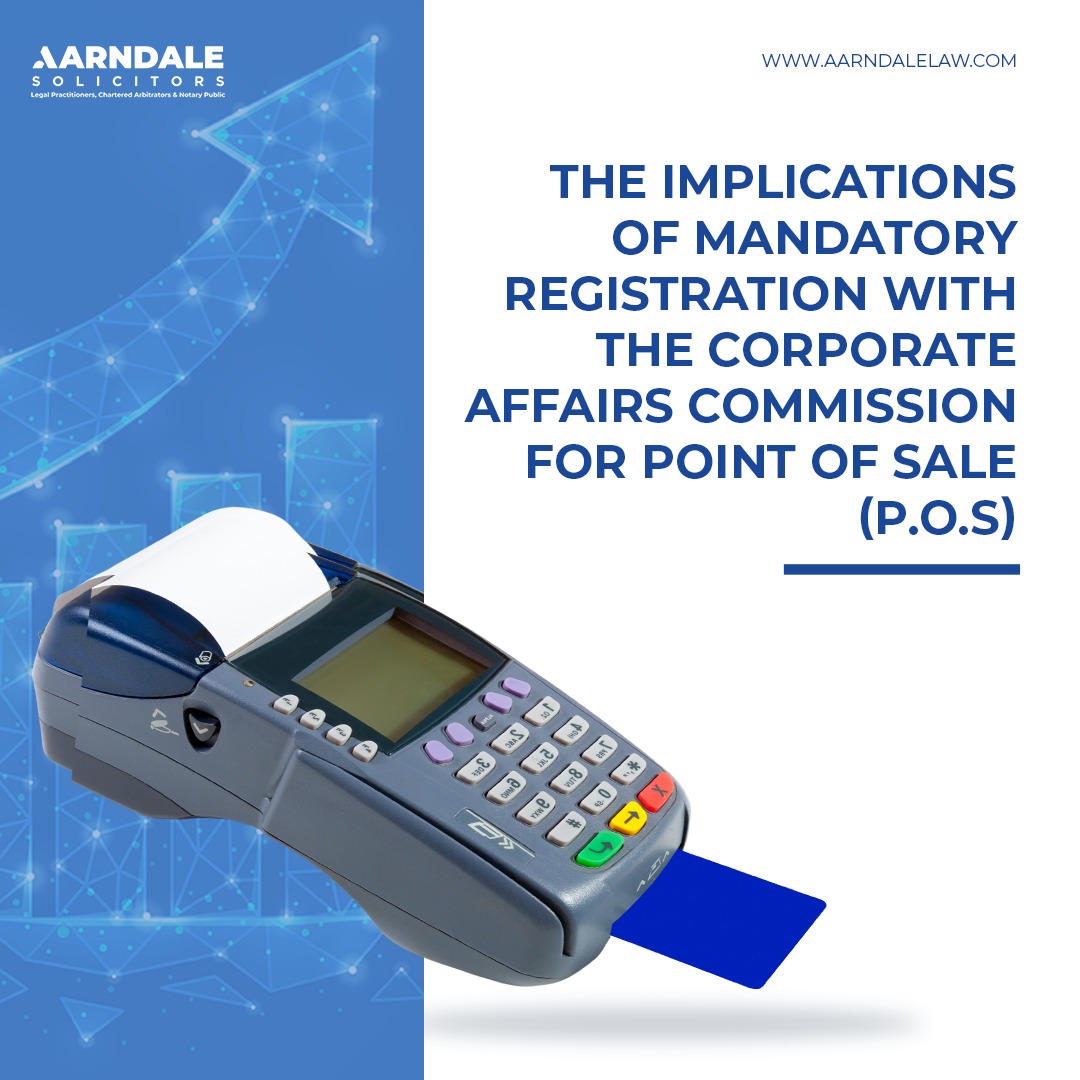The Nigerian government, through the Central Bank of Nigeria (CBN), recently mandated the registration of Point of Sale (PoS) operators with the Corporate Affairs Commission (CAC) by July 7th, 2024.
This initiative, endorsed by the Central Bank of Nigeria (CBN), aims to improve efficiency and strengthen supervision in a sector that has experienced rapid growth in recent years. This article explores the implications of mandatory CAC registration for PoS operators in Nigeria, providing insights into its potential impact on PoS operators and the broader financial landscape.
Legal Basis for Mandatory Registration
The legal foundation for the mandatory registration of PoS operators can be traced to two primary pieces of legislation: the Companies and Allied Matters Act (CAMA), 2020, and various regulations issued by the Central Bank of Nigeria (CBN).
Companies and Allied Matters Act (CAMA) 2020:
CAMA provides the general legal framework for business incorporation, regulation, and dissolution in Nigeria. (See PART A – PART F of CAMA for reference) Under CAMA, all business entities that engage in commercial activities with a profit motive are required to register with the CAC.
The CAC cites Section 863(1) of CAMA 2020 as one justification for the registration requirement. This section provides that “A person or association of persons shall not carry on business in Nigeria as a company, limited liability partnership, limited partnership or under a business name without being registered under this Act.”
This act ensures that businesses operate under a recognized legal framework that supports accountability and consumer protection. The act facilitates the regulation of businesses by making them visible and accountable to regulatory authorities.
Central Bank of Nigeria (CBN) Guidelines:
The CBN, as the primary regulator of financial institutions in Nigeria, has the authority to issue guidelines and regulations affecting financial operations, including those of PoS operators. The mandatory registration of PoS operators with the Corporate Affairs Commission (CAC) in Nigeria stems partly from the Agent Banking Guidelines. issued by CBN in 2013.
The CBN’s Agent Banking Guidelines set out rules for how licensed financial institutions (banks) can offer their services through third-party agents. These agents can be individuals or businesses, and PoS terminals are a common tool they use to facilitate transactions.
The CBN’s guidelines often stipulate that any entity providing financial transaction services must adhere to specific regulatory requirements, including registration. The CBN’s regulations aim to ensure the stability and integrity of the financial system, prevent fraud, and protect consumers.
The Objective of Mandatory Registration
The CBN cites several reasons for this new regulation:
- Enhanced Transparency and Accountability: Registering PoS businesses with the CAC brings them under a formal legal framework, increasing transparency and accountability within the sector. This can help to identify legitimate operators and deter fraudulent activities.[1]
- Improved Customer Protection: Formal registration allows for better customer protection mechanisms. Customers can verify the legitimacy of a PoS operator through the CAC database, reducing the risk of dealing with unregistered entities.[2]
- Combating PoS Fraud: Losses due to PoS fraud have increased in Nigeria, with figures reaching N4.4 billion in 2023.[3] The CBN believes registration can deter fraudulent activities by making it easier to track and identify perpetrators within the system.
Potential Benefits of Registration
- Increased Trust and Confidence: Formal registration can instill greater trust and confidence in the PoS system amongst customers. Registration clarifies the legal status of PoS operators, defining their responsibilities and rights under Nigerian business law.
- Improved Access to Financial Services: Registration can pave the way for increased access to financial services for PoS operators. They might be eligible for loans, credit facilities, and other financial products from banks and other financial institutions that require formal business registration.
- Enhanced Regulatory Oversight: The CAC can play a more active role in regulating the PoS sector with mandatory registration. This can lead to the establishment of best practices, training programs, and grievance redressal mechanisms for PoS operators and customers alike.
Challenges and Concerns
- Cost of Registration: The registration process with the CAC incurs fees that some PoS operators, particularly those operating on a small scale, might find burdensome.[4] This could lead to some operators exiting the business or passing on the cost to customers through higher transaction fees.
- Potential for Business Disruption: Meeting the registration deadline and complying with CAC regulations might disrupt the operations of some PoS businesses, especially those that are currently informal or lack proper documentation.
- Impact on Financial Inclusion: The Association of Mobile Money and Bank Agents of Nigeria (AMMBAN) argues that the registration requirement could discourage individuals from entering the PoS business, hindering financial inclusion efforts in remote areas.[5]
Conclusion
The mandatory CAC registration for PoS operators in Nigeria is a significant development with both potential benefits and challenges. Increased transparency, accountability, and improved customer protection are positive outcomes. However, addressing concerns around the cost of registration, potential business disruption, and the impact on financial inclusion is crucial for a smooth transition. Open communication between regulators, PoS operators, and industry stakeholders will be essential to ensure the success of this new policy.
[1] Damilola Aina & Josephine Ogundeji (7th May, 2024) “FG orders registration of 1.9 million PoS operators” PUNCH https://punchng.com/fg-orders-registration-of-1-9-million-pos-operators/ Accessed 8/05/2024
[2] Treasure Orokpo (7th May, 2024) “CBN orders registration of PoS operators with CAC within two-month” IDOMA VOICEhttps://idomavoice.com/cbn-orders-registration-of-pos-operators-with-cac-within-two-month/ Accessed 8/05/2024
[3] Victoria Fakiya (7th May, 2024) New anti-fraud law mandates Nigerian PoS agents to register as businesses with regulator.” TECHPOINT AFRICA https://techpoint.africa/2024/05/07/techpoint-digest-829/Accessed 8/05/2024
[4] Sami Tunji (24th January, 2024) “PoS operators decry CAC mandatory registration, threaten to hike transaction charges.” PUNCH https://punchng.com/cash-swap-cbn-bars-abuja-lagos-pos-operators/ Accessed 8/05/2024
[5] Treasure Orokpo (7th May, 2024) “Nigeria Communications Week. AMMBAN Decries CBN Directive on CAC Registration of PoS Operators.”IDOMA VOICE https://idomavoice.com/cbn-orders-registration-of-pos-operators-with-cac-within-two-month/ Accessed 8/05/2024

